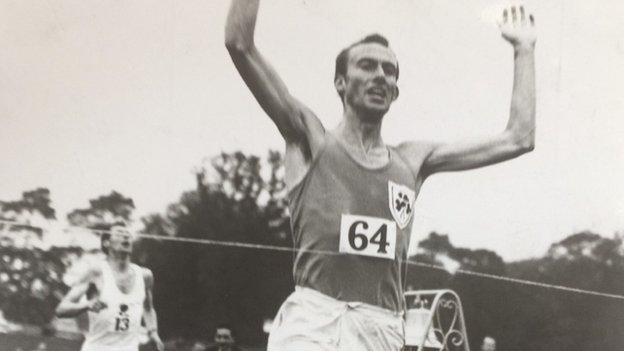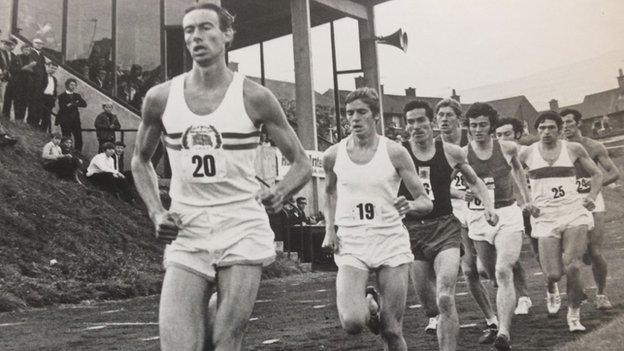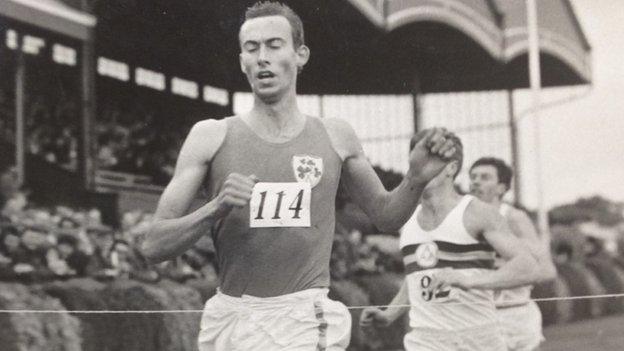Derek Graham: Belfast running great has Irish records restored after 53 years
- Published

Derek Graham sets an Irish three-mile record at Santry in July 1965 as he takes victory for Ireland in an international match against England
Belfast man Derek Graham has had seven Irish athletics records recognised more than 50 years after they were airbrushed from Irish sporting history.
Graham, 78, won an International Cross Country medal for Ireland in 1966 but soon was among Northern Irish athletes banned from even racing in the south.
His story was highlighted in a recent BBC Sport Northern Ireland article.
Arising from that, Athletics Ireland has now restored Graham's name to its national records timelines.
"I'm very grateful to the people who made this happen," said Graham, who has had long-standing health issues and is currently cocooned at home during the Covid-19 pandemic.
"For example, Pierce O'Callaghan of Athletics Ireland's technical committee looked at my times on their merits, without any other considerations, and then told his colleagues that something needed to be done about this. I know without his input this wouldn't be happening.
"It's such a long time ago and I didn't really want to be rocking any boats at this stage of my life.
"But looking back at that time, having the Irish records effectively taken away from me and more so not even being allowed to race in Dublin really did upset me because I loved competing down there and the whole atmosphere in places like Santry Stadium and College Park.
"I got a lot more support in Dublin from people who were knowledgeable athletics fans than I ever got in Belfast so having all that taken from me was very hurtful at the time."
Graham competed for Great Britain at the 1964 Olympics in Tokyo and 1966 European Championship but up until 1967 could also represent an All-Ireland team at the International Cross Country Championships, which was the global event in those days through the muck and over the hills.
In 1966, aged only 24, Graham placed a magnificent second at the International Cross Country in Morocco when those behind him included France's then world mile record holder Michel Jazy.
Graham's performance was Ireland's first individual men's medal at the championships in 35 years and remained the best Irish male feat in the event until John Treacy's successive gold medals in 1978 and 1979, by which time it had been renamed as the World Cross Country.

Graham (left) represented Britain in the 1964 Olympics but up until 1967 could also compete for Ireland at events such as the International Cross Country Championship
BLE rulings banned northern athletes from south
The Belfast man also regularly and successfully competed for Ireland teams at international athletics matches which were widespread at that time.
But in the summer of 1967, Graham became a victim of a ruling by the then newly constituted Irish athletics governing body Bord Luthchleas na hEireann (BLE), which forbade athletes affiliated to the Northern Ireland Amateur Athletic Federation (NIAAF) from competing south of the border as splits which bedevilled the sport's history on the island again surfaced.
As he held down a full-time job at the time, Graham's inability to compete at the regular major meetings held in Dublin contributed to him missing out on selection for the 1968 Olympics in Mexico.
In spite of that, he continued to set times faster than other Irish-born athletes over several distances - including a world's best half marathon time in 1970 which wasn't bettered for six years.
Athletics Ireland's adjustments to its records' progressions to accommodate Graham's performances now sees him having Irish national marks recognised over two miles, three miles and 5,000m.
An Irish solution to an Irish problem means Graham's performances after BLE's formation in 1967 will be ineligible for Irish record status while two of the Northern Irishman's times prior to that, somewhat oddly, are also not being recognised because they occurred when he was on GB international duty.
Two-mile, three-mile and 5,000m marks restored
However, his performances which have been officially recognised by Athletics Ireland start with his two-mile time of eight minutes 33.8 seconds from June 1965, which was 6.6 seconds faster than Tom O'Riordan's 1963 mark.
Jerry Kiernan, who subsequently broke O'Riordan's mark with a 1977 clocking of 8:36.00, is now described as the BLE ratified record holder at that time.
The new Athletics Ireland records progressions document Graham as having broken the Irish three-mile record three times.
The first occasion was in June 1964 when he and O'Riordan both clocked 13:18.4 in a Santry race where the northerner took a photo-finish victory.
Graham bettered that twice the following summer when he ran 13:17.8 in the Clonliffe International at Santry Stadium before improving it with a 13:15.8 posting at the AAA's Championship.
The new Irish records timeline credits him with two national 5,000m records - a 14:01.2 set while running for Ireland against England and Wales in August 1964 plus a 13:51.6 clocking at the Weltklasse meeting in Zurich in June 1965.
In addition, Graham's indoor three-mile best of 13:25.9 set in California in March 1967 - just before the southern ban on Northern Irish athletes - is also now regarded as having been an Irish record.

Graham set a succession of Irish records before the formation of BLE saw his times being erased from the record books
Fell out of love with the sport
The cut-off point of BLE's formation in 1967 means that Graham's 1968 5,000m personal best of 13:41.6 is not deemed an Irish record with the same applying to his remarkable world best half marathon time of 63 minutes and 53 seconds set in 1970.
In addition, his 13:47.6 outdoor 5,000m in June 1966 and indoor 5,000m time of 13:59.8 from a year earlier are not being regarded as national records because he achieved those times while competing in international matches for Britain.
Graham's competitive career effectively ended after he picked up a virus at the 1970 Commonwealth Games in Edinburgh, which caused huge damage to his immune system - the legacy of which remains to this day.
The Belfast man did compete sporadically as a veteran athlete - when he still won regularly despite his ill-health - but maltreatment by officialdom had caused him to fall out of love with the sport.
"There was a time for 20 years the word 'athletics' was never mentioned in the house," said the 78-year-old in his recent BBC Sport Northern Ireland interview.
"And I don't want to turn it into some north v south thing because the Northern Ireland officials were not much better."